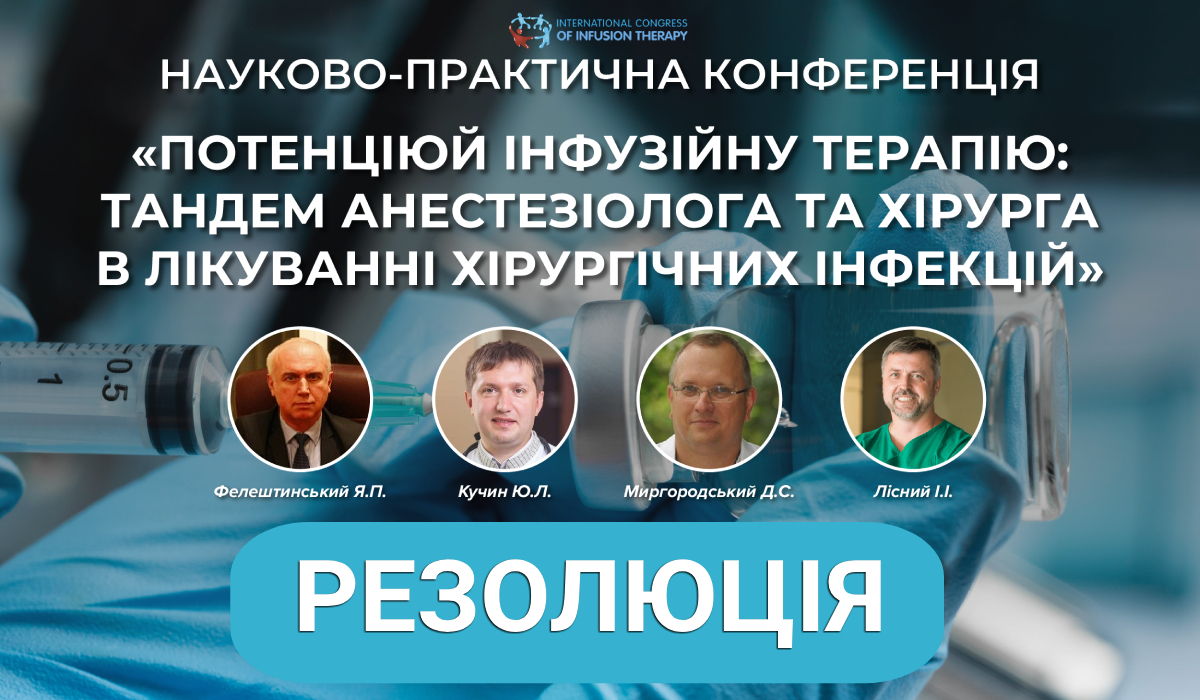Resolution of the online-teleconference "Potentiate infusion therapy: the tandem of anesthesiologist and surgeon in the treatment of surgical infections"
28-06-2023

Almost 2 800 health care specialists have registered to participate in the Teleconference "Potentiate infusion therapy: the tandem of anesthesiologist and surgeon in the treatment of surgical infections", June 21, 2022, Kyiv, Ukraine.
Within the framework of the event, leading specialists and practitioners in the field of anesthesiology and surgery shared their expert opinions and experience in managing patients with purulent-inflammatory diseases.
Particular attention was paid to infusion therapy in the treatment of surgical infections. The urgency of the problem of surgical infections is associated with their high frequency and duration of treatment.
Various methods of surgical intervention, modern antibacterial therapy made it possible to achieve positive results in the treatment of purulent-inflammatory diseases, but the final results of treatment still cannot be considered satisfactory.
4 reports were offered to the participants for review and they were dealing with the following issues:
- Components of successful treatment of patients with peritonitis. The Surgeon's View
- Monitoring of volemic status and infusion therapy of critical patients
- Postoperative recovery of patients with purulent-inflammatory diseases in the surgical department: the role of infusion therapy
- Strengthening of infusion therapy of patients with purulent-inflammatory diseases. Accents from the anaesthesiologist.
Conclusions and decisions based on the discussion of reports:
- Success in the treatment of purulent-inflammatory diseases, along with maintaining the leading role of early surgery, thorough rehabilitation and adequate drainage, largely depend on the fight against intoxication, prevention of secondary complications and rational pre- and post-operative intensive therapy aimed at eliminating of hypovolemia and microcirculation disorders.
- The role of the anesthesiologist in providing infusion support is indisputable, but equally important is the maintenance of the state of euvolemia in the subsequent stages of treatment in the surgical department.
- The purpose of infusion therapy is to achieve the state of euvolemia. The basic preparations for volemic support are balanced crystalloids, the recommended dosage of which, depending on the clinical situation, is from 40 ml/kg to 3 liters.
- The introduction of large volumes of isotonic solutions can cause exfoliation of glycocalyx, the protective layer of the inner surface of the capillaries, resulting in capillary leakage syndrome and interstitial edema. That is why, recently, the strategy of low-volume infusion therapy has become especially popular, which allows reducing the volume of administered drugs.
- A multicomponent hyperosmolar solution may be used to potentiate standard infusion regimens.
- The inclusion of Reosorbilact into the standard infusion therapy regimen at a rate of 7 ml/kg/day can increase the volume of circulating blood against the background of a decrease in the total volume of infusion necessary to achieve a therapeutic effect, without the risk of hyperhydration and fluid overload, which is especially important for patients in critical conditions.
You can download the text of the Resolution by this link.
🎬 Didn’t see all the reports? View the video recording of the conference:
❗We recommend you to subscribe on our Facebook-page and YouTube channel. It is regularly updated with interesting and relevant video-reports of well-known Ukrainian and international speakers in the field of medicine.
Have you registered for our events before?
Subscribe to the "Infusion Therapy" chatbot on Telegram or the "Infusiontherapy" chatbot on VIBER. ✔ Receive up-to-date information, interesting announcements and news on the topic of infusion therapy!
